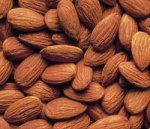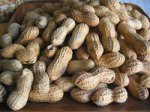Hippocrates (480 BCE-370 BCE), the Father of Western medicine, had the secret of antioxidants in a healthy diet, even though he may not have known it when he said, “Let food be thy medicine and medicine be thy food.” He knew the power of foods from nature was both healing and preventive and emphasized that message to his followers. Though he didn’t have the scientific knowledge that foods from nature, such as tree nuts, contained powerful antioxidants, he witnessed healing taking place when patients ate pure whole foods. He recognized those foods contained remarkable elements that could not only prevent disease but also restore vigor.
Fresh, plant-based foods (nuts, seeds, fruits, vegetables, whole grains, and legumes) do, indeed, contain powerful plant chemicals packed with antioxidants. What are these antioxidants and what can they do? While all plant-based foods contain these powerful healing elements, recent research has revealed the impressive antioxidant potential in tree nuts.
Researchers find nut benefits Intensive tree nut studies have uncovered an array of antioxidant chemicals including lignans, napthoquinones, phenolic acids, phytosterols, polyphenols, flavonoids, proanthocyanidins, and tocopherols that can reduce inflammation in the blood, lower cholesterol, act against viral invasion, and protect the body from tumor growth.
Because we now know that antioxidants can scavenge and prevent unstable molecules called free radicals from destroying our cells, we can take joy in devouring a delicious handful or two of tree nuts every day to reap the many benefits from their excellent antioxidant properties.
In a 2009-study published in the Journal of Human Nutrition and Diet, researchers tested thirteen subjects to study the effect of a polyphenol-rich diet of walnuts or almonds on the blood. The subjects fasted overnight, had blood tests, and then were given either a walnut or almond smoothie or one that contained no nuts. After a week, each participant switched to a different smoothie, and each time, blood was tested several times after beverage consumption. Researchers found a noticeable increase in polyphenols, a type of antioxidant, after subjects consumed the nut-based smoothies, but no change following the nut-free beverage. Noted were a significant increase in total antioxidant capacity and a reduction of blood oxidation in those participants consuming the polyphenol-rich nut smoothie.
Pecans have their own antioxidant story In another study conducted at Loma Linda University, meals including whole pecans and blended pecans were compared with a control meal with no nuts to test for antioxidant activity. This small trial of sixteen healthy men and women used the crossover method where participants were given each meal at controlled intervals with a week in-between. Blood levels of tocopherals, the vitamin E antioxidant, doubled in those consuming whole and blended pecans, while antioxidant levels increased 12% and 10% respectively two hours after consumption. After meals including whole pecans, LDL oxidation decreased considerably after consumption. Triglycerides decreased only after the participants ate whole or blended pecans in their meals.

Pecans have their own antioxidant story In another study conducted at Loma Linda University, meals including whole pecans and blended pecans were compared with a control meal with no nuts to test for antioxidant activity. This small trial of sixteen healthy men and women used the crossover method where participants were given each meal at controlled intervals with a week in-between. Blood levels of tocopherals, the vitamin E antioxidant, doubled in those consuming whole and blended pecans, while antioxidant levels increased 12% and 10% respectively two hours after consumption. After meals including whole pecans, LDL oxidation decreased considerably after consumption. Triglycerides decreased only after the participants ate whole or blended pecans in their meals.
Chemistry Professor Joe Vinson, Ph.D. presented his research at a meeting of The American Chemical Society in Anaheim, California in March 2011 showing that walnuts have more high-quality antioxidants than any other nuts. “Walnuts rank above peanuts, almonds, pecans, pistachios and other nuts,” said Dr. Vinson. “A handful of walnuts contains almost twice as much antioxidants as an equivalent amount of any other commonly consumed nut. But unfortunately, people don’t eat a lot of them. This study suggests that consumers should eat more walnuts as part of a healthy diet.”
To roast or not to roast After Dr. Vinson’s analysis compared the antioxidants in walnuts, almonds, peanuts, pistachios, hazelnuts, Brazil nuts, cashews, macadamias, and pecans, he found antioxidants highest in raw, unroasted nuts. Vinson says, “The heat from roasting nuts generally reduces the quality of the antioxidants. People usually eat walnuts raw or unroasted, and get the full effectiveness of those antioxidants.”
When nuts are commercially roasted in added fats, like partially hydrogenated oils that contain trans fats or coconut or palm oils that are high in saturated fats, they raise the risk of heart disease by elevating the bad cholesterol that can deposit plaque in the arteries. Commercially roasted nuts may also be roasted at high temperatures that possibly damage or reduce antioxidant levels.

When nuts are commercially roasted in added fats, like partially hydrogenated oils that contain trans fats or coconut or palm oils that are high in saturated fats, they raise the risk of heart disease by elevating the bad cholesterol that can deposit plaque in the arteries. Commercially roasted nuts may also be roasted at high temperatures that possibly damage or reduce antioxidant levels.
Differing opinions persist regarding antioxidant loss when roasting nuts. An inquiry to the California Walnut Commission turned up this response from their nutrition consultant, registered dietician Carol Berg Sloan, “We have had independent nutrient analysis done on raw and toasted walnuts and there is no change in the nutrient profile.”
Plant chemicals in nuts improve heart health Dr. Joan Sabate, professor of nutrition at Loma Linda University, and colleagues examined 25 nut studies from other countries. Their nut research has shown that regular consumption of nuts reduces the risk of coronary heart disease in several ways: lowering cholesterol levels, improving endothelial function, lowering oxidation in the blood, and reducing lipoprotein(a) levels. The researchers focused both on subjects with normal and high cholesterol and noted that nut consumption led to a marked improvement in both HDL and triglyceride levels. Along with their exceptional nutritional qualities, nuts contain an array of phytonutrients or plant chemicals with high antioxidant capacity.
An almond study at Tufts University unveiled 20 powerful antioxidant flavonoids in almond skins. Some of the flavonoids were the same antioxidants found in familiar foods like green tea that contains catechins and grapefruit that includes naringenin. The research team tested the antioxidants separately and together on blood samples that contained LDL cholesterol. Flavonoids in the almond skins improved the LDL resistance to oxidation by 18%, but when tested together with vitamin E in the meat of the almond, the resistance to oxidation increased by 52.5%. This research illustrates the benefits of the synergy that occur in nature and the importance of eating the whole nut, including the skin.

An almond study at Tufts University unveiled 20 powerful antioxidant flavonoids in almond skins. Some of the flavonoids were the same antioxidants found in familiar foods like green tea that contains catechins and grapefruit that includes naringenin. The research team tested the antioxidants separately and together on blood samples that contained LDL cholesterol. Flavonoids in the almond skins improved the LDL resistance to oxidation by 18%, but when tested together with vitamin E in the meat of the almond, the resistance to oxidation increased by 52.5%. This research illustrates the benefits of the synergy that occur in nature and the importance of eating the whole nut, including the skin.
Which nuts lead the antioxidant parade? Of all the tree nuts, walnuts, pecans, and chestnuts contain the greatest amount of antioxidants. Although peanuts are technically legumes, they are nutritionally similar to nuts. Like walnuts, peanuts are packed with high levels of antioxidants. Be sure to consume nuts whole to gain their full benefit, since much of the antioxidants are contained in the skins.
Antioxidants and plant chemicals are not the only healthful attributes of nuts. Nuts are an excellent source of protein, a quality that has placed them in the USDA MyPyramid Dietary Guidelines for Americans alongside meat, poultry, and fish. Nuts are also a powerhouse of minerals including calcium, magnesium, potassium, iron, zinc, selenium, and copper that work as a cooperative team to bring excellent health and maximum immune function to the body.

Antioxidants and plant chemicals are not the only healthful attributes of nuts. Nuts are an excellent source of protein, a quality that has placed them in the USDA MyPyramid Dietary Guidelines for Americans alongside meat, poultry, and fish. Nuts are also a powerhouse of minerals including calcium, magnesium, potassium, iron, zinc, selenium, and copper that work as a cooperative team to bring excellent health and maximum immune function to the body.

No comments:
Post a Comment